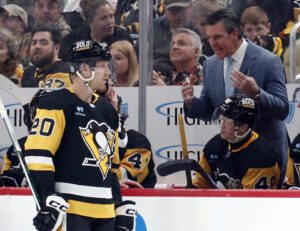The author of famous quotes, Yogi Berra, is reported to have said, “when you come to a fork in the road, take, it.” It’s not terribly useful advice for most people, but I suspect the San Jose Sharks Doug Wilson, the team’s general manager, can relate.
His Sharks are at a fork in the road. On the one hand, Wilson has elite players entering the downward stages of their careers. If he wants a Stanley Cup, he’ll need to go for it sooner than later.
On the other hand, his roster doesn’t suggest the team is capable of a Stanley Cup run. The miserable 2019-20 season was a major aberration from the prior 15 years of Sharks hockey. And there is justified concern that the 2019-20 season will resemble the Sharks future.
It needs to be said. The Sharks Doug Wilson has done a remarkable job leading the hockey operation. The team has been highly competitive almost every season and he’s done this without high draft picks. He’s never drafted in the top five and rarely in the top 10. Wilson’s success has come despite not having the best shots at grabbing elite talent.
He also deserves credit for taking a chance in 2018-19, putting together an enormously talented team. Injuries undermined the team’s shot at Stanley Cup, but at its peak (which was reached in December and January), the team was superb.
The challenge Wilson faces is a legit one, and one of his own making. But also, one which is the byproduct of rational decisions.
So which fork does Wilson take? His actions present the clearest picture while his words leave more room for interpretation.
The Rebuild Road Case
The rebuild case is straightforward. The team is stressed by an expected multi-season flat salary cap (an offshoot of COVID-19), meaning relief is years away. Rebuilding by adding talent at market rates is unlikely to get the job done. The pool of younger players who can make an impact seems destined to make not enough of an impact.
It has long been assumed a successful product on the ice is needed to get Sharks fans in the seats. But COVID-19 means the on-ice product won’t matter much on this front, as the venue is likely to remain closed to fans, or at best, allow small numbers of fans into the venue for a large portion of the upcoming season.
The Sharks need a prospect pipeline while the flat salary cap works against the team reloading with middle-class salaried veterans. A rebuilding season helps on both these fronts.
Rebuild road, unappealing as it is, seems inevitable. A matter of when not if.
Rebuild Road
What suggests Wilson has taken this road? For starters, a pair of trades he made late last season. One can roughly categorize players into two categories, either ‘part of the solution’ or ‘part of the problem’. Barclay Goodrow and Brenden Dillon were both ‘part of the solution’ players.
Goodrow played a meaningful role in the Tampa Bay Lightning’s Cup victory, while Dillon was, by far, the best complimentary defenseman in the organization (best Corsi For % for each of the Sharks three right-shot defensemen was achieved with Dillon).
The trades gave Wilson additional draft picks which he used earlier in October. They are now Sharks prospects which may, one day, turn into useful NHL players. But not in 2021.
There weren’t many positives for the Sharks last season, but the penalty kill was one. Goodrow led all Sharks forwards in PK ice time, despite only playing in 62 of the Sharks 70 games. Dillon averaged over 2 minutes of PK time per game and his PK minus-8 was the best among the core defensive group. Goodrow’s deal is inexpensive while Dillon didn’t break the bank when he re-signed with the Washington Capitals.
Dillon and Goodrow were the Sharks’ two best value contracts in 2019-20. Players to keep if one wishes to compete in the near term. The trades were rational only for a team investing in the longer term.
Wilson also went the inexpensive route on the coaching hire by retaining Bob Boughner. In three seasons as an NHL head coach, Boughner has yet to lead his team to the playoffs. Wilson went with Boughner over several available coaches with vastly more impressive resumes. Boughner’s staff skews young and is pulled from coaches with recent in the AHL stints, suggesting development will be an emphasis.
The Future Is Now Case
Wilson invested heavily in his defensive trio and none are at an age which suggests they are too old to play elite hockey. They need to rebound. So does goalie Martin Jones. The overworked Jones was dropped to a back-up role in the middle of last season. But Boughner returned him to the nets late in the season and Jones delivered a small, but highly encouraging series of games.
The Sharks forwards can play better. A new group of assistants means a culture change is underway. Plus the long offseason represents a chance for a group reset, mentally and physically.
The upcoming 2021 season has unpredictability written all over it. The Sharks have enough talent that if they can capture lightning in a bottle, the team can be a legit Cup contender.
The Future Is Now Road
So what suggests Wilson expects a return to Stanley Cup competitor this season? Not a lot. The Sharks have been given the green light to spend to the salary cap by ownership. While the light might be green, he’s going more at a yellow speed. When asked specifically about using the remaining available cap space, his answer focused instead on internal competition and re-establishing the team’s game.
Wilson expects a better than last season, but not via an upgraded roster. He expects the improvement to come from within the room.
Two ‘the future is now’ moves were recently made. Wilson procured netminder Devan Dubnyk, considering this an upgrade from the under-appreciated (and inexpensive) Aaron Dell. In a separate move, Wilson traded for Ryan Donato, an offensively gifted but defensively questionable left-shot forward. Donato was frequently benched last season by Minnesota Wild head coach Dean Evason, including in two of the team’s four August play-in games. Since both players have one year remaining on their deals, it is safe to assume these trades are more about improving the Sharks for this upcoming season and less about the longer term.
Wilson paid little for these acquisitions, sending out a mid-third-round pick and a fifth-round pick while receiving a seventh-round pick. Still, these deals traded away future potential for present improvement. The $4.0million combined salary cap hit is meaningful for a team with limited cap space and substantial remaining needs. Dubnyk alone takes up an additional $1.3million in cap space compared to Dell’s deal with the Toronto Maple Leafs.
There is little to suggest Wilson thinks the future is now. Could Donato and Dubnyk get traded at the 2021 trade deadline? Probably, perhaps greater for value than Wilson paid to acquire them. These are hedged bets.
Sharks Doug Wilson Faces Reality
Do the Sharks have what they need to actually contend for hockey’s big prize? The answer is a highly qualified yes. They’ll need an enormous number of things to go right, many of which seem unlikely to go right. Several key players will need to deliver bounce-back seasons. Several younger players will need to improve substantially over last season.
The holes are daunting. The Sharks have two question marks in goal and insufficient quality middle-six forwards. The team has a trio of formerly elite defensemen who command 1/3 of the team’s salary cap, and only one player (Radim Simek) whose shown he can effectively complement a member of this trio. The team’s best forwards were beaten up last season and one of them, Tomas Hertl, is coming off a significant knee injury.
As a group, the team struggled with chemistry, both on the ice and apparently, in the locker room. Passing the puck and offensive creativity are both weak spots. So was the power play. And it’d help if Evander Kane, among the team’s best players, didn’t spend so much time in the penalty box. The penalty kill was elite, but as mentioned earlier, two of the team’s top penalty killers are gone.
The Sharks Doug Wilson not only needs to fix a great deal that wasn’t working but makes sure the team didn’t break what was working.
To be a contender, the list of things the team needs to go right is long. But if the top three defensemen deliver to levels we’ve seen from them in the not too distant past (think January 2019), the Sharks can present a severe match-up problem for other teams.
Awkward Decisions
Perhaps the most intriguing move in the lengthy COVID-19 induced offseason was a decision the Sharks Doug Wilson didn’t make for many months. That was to officially remove the interim tag from the title of Boughner. Boughner carried the interim head coach title for nine months, from December 2019 into September of 2020. This doesn’t suggest “confidence” as much as it suggests the question “is this really the right direction for us?”
Embedded in this equation is Wilson’s future with the Sharks. He’s been successful, even if a Stanley Cup has eluded him. The expectations and patience of Sharks 76-year-old owner Hasso Plattner weigh heavily here. The German-based Plattner rarely publicly comments on the team. The length of Wilson’s leash isn’t public knowledge, but Wilson surely knows.
But perhaps the best example of the awkwardness facing the team is this. Wilson recently spoke about his very high expectations for Erik Karlsson, the league’s highest-paid defenseman. But he traded away Dillon, the best partner (by far) Karlsson has had as a Shark.
Sharks Doug Wilson And His Fork In The Road
Wilson’s actions tell the story. The upcoming season is not about taking the team’s best shot at a championship, it is about resetting the franchise. Still, parting with draft picks to acquire players with one year left on their deals is ‘now’ thinking. But most everything else speaks to a reset. From the draft to free agent signings to the coaching staff selection to the lack of Wilson’s signature move, the big trade.
Wilson decided to tack mostly in one direction. Whether he is wholly committed to this new direction is less clear. I sense he is hedging his bet. He’s too much of a competitor to simply write off this season and there’s too much talent to accept another underachieving season from this group.
I understand the desire to linger at the fork in the road; hoping clarity emerges during the season. If things break right, the Sharks might find themselves on an unlikely avenue to a great season. But lingering feels like the riskiest approach.
Yogi Berra’s advice might prove prescient. Doug Wilson is at a fork in the road. And he needs to take it. Either reset now or push aggressively forward this season. Anything in between is a road best avoided.
Zeke’s Notes
• The Sharks draft had two major anomalies. The team selected nine times in all, but none of the nine picks happened in the Sharks original draft position. Every Sharks draft spot was reached via a trade.
• And the team selected only forwards. Depending on how one approaches the analysis, the odds of this happening randomly are between 0.2% and 0.9%. For the record, the team claims they selected the best available player, independent of position, with each pick.
• The departure of Sharks legend Joe Thornton is another indicator of where the Sharks are and where Wilson sees the team. A brilliant career with only a Stanley Cup missing from his resume, Thornton decided his shot a Stanley Cup is best taken elsewhere. In his press conference addressing the Thornton departure, Wilson said Thornton’s left for a team that is recently proven better than San Jose.






